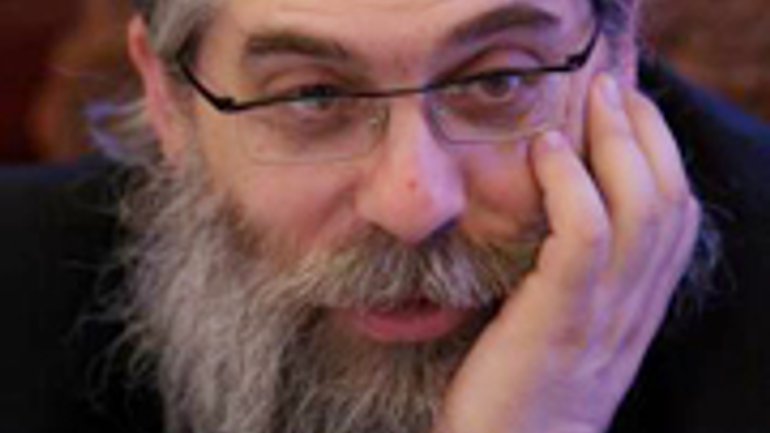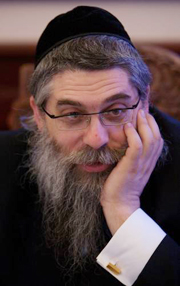Chief Rabbi of Kyiv Yakov Dov Bleich on Ukraine gaining its independence

 Yakov Dov Bleich – Chief Rabbi of Kyiv and Ukraine for Orthodox Judaism. President of the Union of Jewish Religious Organizations of Ukraine. In 1989, moved to Ukraine from the US, where he served as the rabbi in Kyiv’s main choral synagogue. In 1990, appointed Chief Rabbi of Kyiv and Ukraine. At the end of 1992, founded the Union of Jewish Religious Organizations of Ukraine. Since 2001, Vice President of the European Council of Jewish Communities and Vice President of the European Jewish Congress. This interview is shortened version of the talk with Sara Sievers as part of the project The collapse of the Soviet Union: the Oral History of Independent Ukraine
Yakov Dov Bleich – Chief Rabbi of Kyiv and Ukraine for Orthodox Judaism. President of the Union of Jewish Religious Organizations of Ukraine. In 1989, moved to Ukraine from the US, where he served as the rabbi in Kyiv’s main choral synagogue. In 1990, appointed Chief Rabbi of Kyiv and Ukraine. At the end of 1992, founded the Union of Jewish Religious Organizations of Ukraine. Since 2001, Vice President of the European Council of Jewish Communities and Vice President of the European Jewish Congress. This interview is shortened version of the talk with Sara Sievers as part of the project The collapse of the Soviet Union: the Oral History of Independent Ukraine
Why did you first came to Ukraine and what did you see when you got here?
I first came to Ukraine in 1989, 1988 actually, as a tourist. What I found when I got here was the shambles of a Jewish community. We came through Moscow. Moscow was one feeling and Kyiv was a totally different feeling. Basically, the only people that we met at that time were members of the Jewish communities in Kyiv. We went around to a lot of different Jewish cemeteries to see the graves of many different people. We met with Jews here in the city. Actually what I saw was a population that was starving for something, starving for news of the outside world, starving for news of the Jewish world, since it was Jews we were meeting with. They were not only starving for news but also wanted to reconnect. And that caused me to make my second visit, not only as a tourist but as a rabbi in ‘89.
At that time I traveled and met with Jews in a number of cities including Vinnytsia and Kyiv. And, I spent a little more time meeting people and less time traveling to graves at that time.
When I got back from that visit, I was offered a job to come here to work, to become the Rabbi of Kyiv. So I moved here with my family. We arrived on January 4, 1990. And again, like I said, we were in very close contact with Moscow then. For everything we needed we would travel to Moscow, like if you were in a grocery store in the states, you would go to Moscow to buy Pampers. You know what I mean? The difference in the atmosphere for Moscow – Perestroika, freedom, political freedom – you were able to see it, feel it. Religious freedom, you were able to see it, feel it. In Kyiv, it was only in the papers, as they say. There was nothing really that you were able to do there openly and freely. People were still afraid and they had a lot to be afraid of in those days. We got here and started working with the Jewish community. We opened a Sunday school. We started trying to educate Jews. That is what our job was. That’s what our mandate was, to liven up the community. Give people something to look forward to, to hope for and to start educating them.
Can you describe the Jewish community before you started working with it? How organized was it? What was its size? What were its priorities? Its relationship with the government? With different political forces at that point, the nationalist forces?
The Jewish community wasn’t really organized when I got here. The only thing that was organized was the synagogue, which had been open since ‘46, immediately after the war. The synagogue was built in 1896. During the war, of course, everything was closed. In ‘46 this synagogue was opened. In the ‘60s, besides the synagogue here, people would gather in homes for private prayer meetings, minyans as they are called. The only way I know this, really, is from archives that we’ve found. Archival material of the Communist Party and the reports of the Upolnomochiye Po Delam Religii (Committee for Religious Affairs) and everything else that we see that they have, all of these show us exactly what the situation was. We know in 1962 there were 15,000 Jews in the synagogue on Yom Kippur, the Day of Atonement, and 6,000 on Rosh Hashanah, the Jewish New Year. We know it from them, not from us.
In any case, the only thing that was organized was these cultural societies called the Societies for Jewish Culture. They weren’t Jewish, per se. They were usually dominated by communists, Jewish communists, and if not communists just people singing the tune. They didn’t have anything Jewish going on. The most Jewish that they got was that they would learn Yiddish. That was the most. So when we came there was really nothing to talk about.
Now what political force are you talking about? In 1988, 1989, and 1990 what political force was there besides the communists? None. Rukh wasn’t considered a political force. It was considered a troublemaker in those days. And I remember distinctly, it’s so funny that you mention that, Babyi Yar in 1990. Close to 10,000 people came to Babyi Yar on September 29, 1990. And I remember Drach, Ivan Drach speaking at Babyi Yar and cursing out the Fascists and those that came after them, the communists. And I remember some famous Jew getting up and saying, “Let’s not say anything bad about the communists. If not for the communist party and the Red Army, we would have never defeated the Germans.” This was the type of rhetoric that you would hear in those days. And that was basically from official Jews. You know the official Jews as we called them Karmannyi Yevrey (poket Jews). That was basically the situation at that time. Nobody thought of anything other than that.
On the other hand, there was a very, I would say, brotherly relationship with the nationalists, to a certain extent, in that we as Jews understood them, and they as Ukrainian nationalists thought we were a good example for them, with Israel and independence, and Israel as a young state and everything else. There was a certain relationship – I’d even say friendship – between the Jewish community and the nationalist community. Besides the fact that many dissidents, many of the Ukrainian nationalists who sat in jail, sat in jail equally long as did the Jewish dissidents.
During this period the developing leadership among the Jews was very often made up of dissidents. And the developing leadership among the Ukrainians was also made up of dissidents. And very often they had been together in prison. They had been “brothers in arms,” so to speak, in their repression and persecution in the communist days. As a matter of fact, Joseph Zesels, who was the leader of the Ukrainian Va, was in jail for Ukrainian nationalism (laughter). He was very friendly with many of the Ukrainian dissidents from those days.
Can we go back to when you came over and really started organizing the Jewish community: Can you describe how you did it? What support did you get from various people and what difficulties did you encounter?
Yeah, and we got here in January of 1990, started working in January of 1990, and we actually started with the Sunday school. Our first amendment was education. We got the synagogue organized immediately. Just to get ten Jews to come in the morning and evening for prayer services. But the main thing was to attract people to understand what Judaism was all about, that it was not just a nationality like they were taught to think all those years.
As an observer of the political process now, putting on your American in Kyiv hat, what were some of the events that were striking to you and when did you first realize that Ukraine could possibly become independent?
Well, the All Union Treaty was something that everyone followed with interest. And basically we all knew that Ukraine was going to make it or break it. It was obvious at that day in age. I see the turning point, August 21 was it? You know, at the end of the Coup. I think forever embedded in my mind is that day, and I think that that day really meant the end of Gorbachev. I don’t think it was very nice of Yelstin the way he did it, but I think that was basically the end of Gorbachev as a political force and to a certain extent it was the end of the Soviet Union. I mean, August 24 was when Ukraine declares independence, I think that at that point it was already basically more or less obvious that it was going to happen.
So there were a number of events after that. Were they predictable to you?
After that was the Declaration of Independence, which was very predictable. It was December 1. It was the referendum, and everybody knew how it would go. I mean there weren’t any questions then. And then there was the breakup of the Soviet Union, which was an obvious, I mean it came as a direct result of the referendum of Ukraine. Obviously, right?
Why do you consider it obvious?
I mean Ukraine was basically the power at that time. The Soviet Union is today Russia. It still exists in the form of Russia. I mean, it didn’t make too much of a difference in the lives of any Russians, the Soviet Union or Russia. Of the people to whom it made a difference, the largest group of people was in Ukraine. And there was not obviously going to be a Soviet Union without Ukraine. Right? As they say that, you know they say it about Odesa even though it’s not the first, but it’s also not the second. I think that Ukraine might not be the first, but it’s definitely not the second. I think that here it really was the decisive part.









